[Video] Can Guanyun-made lingerie in China become the next Victoria’s Secret?
Guanyun county in Jiangsu province has made a name for itself as the “lingerie capital” of the world, with lingerie trade becoming a key contributor to the once-impoverished county’s economy. Lianhe Zaobao journalist Li Kang finds out what the people of Guanyun think about this industry that carries some taboo.
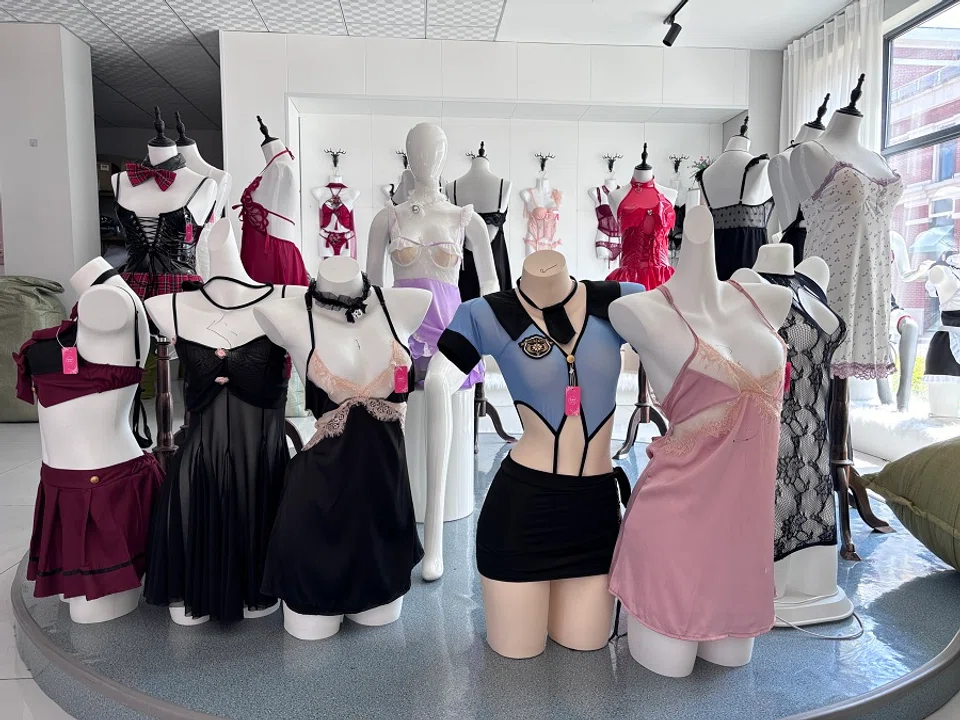
(Photos: Li Kang/SPH Media)
Lace trims, sheer mesh, silky satin, black ribbons and bows… In a factory in Jiangsu province’s Guanyun county, skilled middle-aged women expertly arrange and sew these components together to create alluring pieces of lingerie.
The owner of this lingerie factory is 26-year-old Tao Xiaoxiao. After graduating from university and returning to her hometown to establish the factory, she achieved an annual sales revenue of 50 million RMB (approximately US$7.11 million) in less than three years, while managing nearly 300 employees.
When I visited her factory in early September, Tao appeared fresh out of university in a loose white T-shirt and jeans. Yet her words conveyed a firm determination beyond her years.
Appealing to customers’ needs
Tao said that she had initially opened an online lingerie shop as a side hustle. To her surprise, orders poured in so quickly that suppliers restricted her from purchasing stock. “They wouldn’t let me profit from the price difference anymore, so I decided to start my own business. I challenged myself to surpass them within three months,” she said.
Thus, Tao used the 200,000 RMB that she had earned from her online store during university, along with several hundred thousand RMB from her parents, to open a factory in February 2022. “In less than three months, I was already doing better than the supplier that had rejected me,” she said.
As a woman, her eye for design and photography differs from the mainstream masculine aesthetics dominating the industry, allowing her to differentiate herself in the details.
However, to stand out among the thousands of lingerie factories in Guanyun, and especially to compete against established factories that have been operating for nearly two decades, determination and drive alone are not enough.
Tao believes that her advantage lies in her understanding of young people’s preferences. As a woman, her eye for design and photography differs from the mainstream masculine aesthetics dominating the industry, allowing her to differentiate herself in the details.
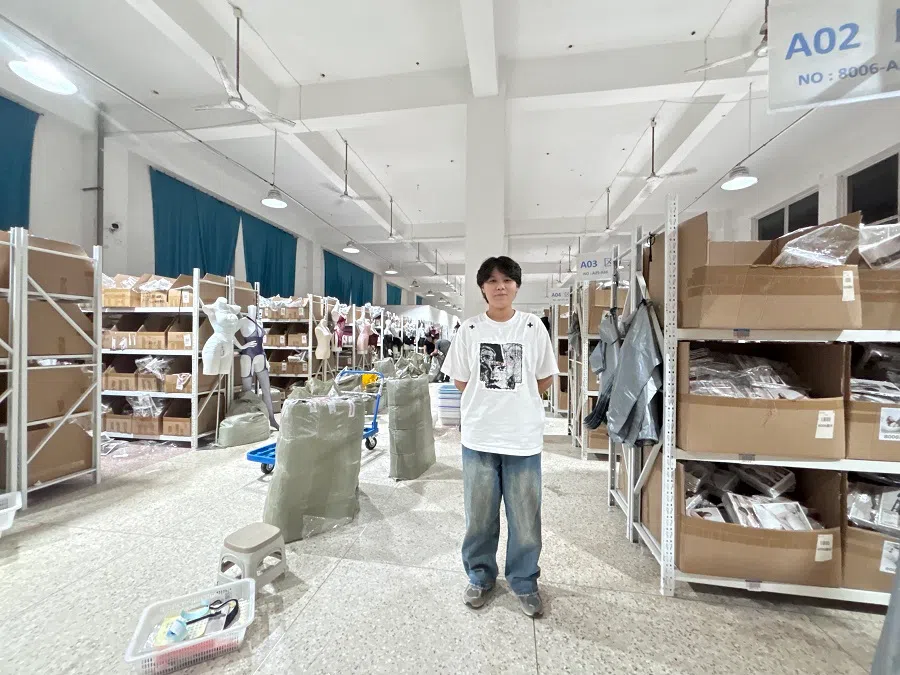
She also stressed that being able to get the factory up and running during the pandemic “had a lot to do with luck as well”.
Guanyun county is located in the northeastern part of Jiangsu province. As it was relatively lagging behind in economic development, the county was listed as one of the 11 key counties for poverty alleviation in Jiangsu in 2006. Driven by the lingerie industry, Guanyun shook off poverty in 2019, and by 2020, the output value of the sector had reached 2.5 billion RMB.
Twenty years ago, this was still just a populous agricultural county. How did Guanyun get into lingerie?
The ‘prince of lingerie’ and Guanyun’s fortune
The version circulating among the locals is that some Guanyun locals who had gone southwards to Guangdong to find work were exposed to sensual wear and brought orders back to the county. Meanwhile, the media has its own twist on the tale, claiming it all began with a local high schooler named Lei Congrui, who opened an online lingerie store. Now he’s affectionately known as “the prince of lingerie” in the community.
Lei, now 33, has been in the lingerie business for 17 years. He told Lianhe Zaobao that it still feels “remarkable” to witness the lingerie industry in Guanyun rise from nothing.
The early 2000s marked the rise of e-commerce in China. Stories of online store owners getting 10,000 orders a day and raking in tens of millions of RMB a year travelled over 500 kilometres from Hangzhou to Guanyun, inspiring the first wave of locals to venture into e-commerce. Lei, still a high school student at the time, was one of them.
Lei opened a Taobao store in 2006 and sold everything from health supplements to condoms. A customer casually asked about lingerie in 2007, and Lei started placing orders when he realised there was a demand. To his surprise, the lingerie he sourced from Guangdong sold out almost instantly, and he raked in 4 million RMB in sales within a year.
After the gaokao (university entrance exams) in 2009, Lei decided to open his own factory. He roped in his aunt to help with the processing, and started production as soon as he found the materials and hired employees. “Actually we’re all amateurs but we just felt that it is something we have to do,” he said.
Numerous local industry practitioners claimed that Guanyun’s lingerie production accounted for 90% of China’s total output and over half of the world’s production.
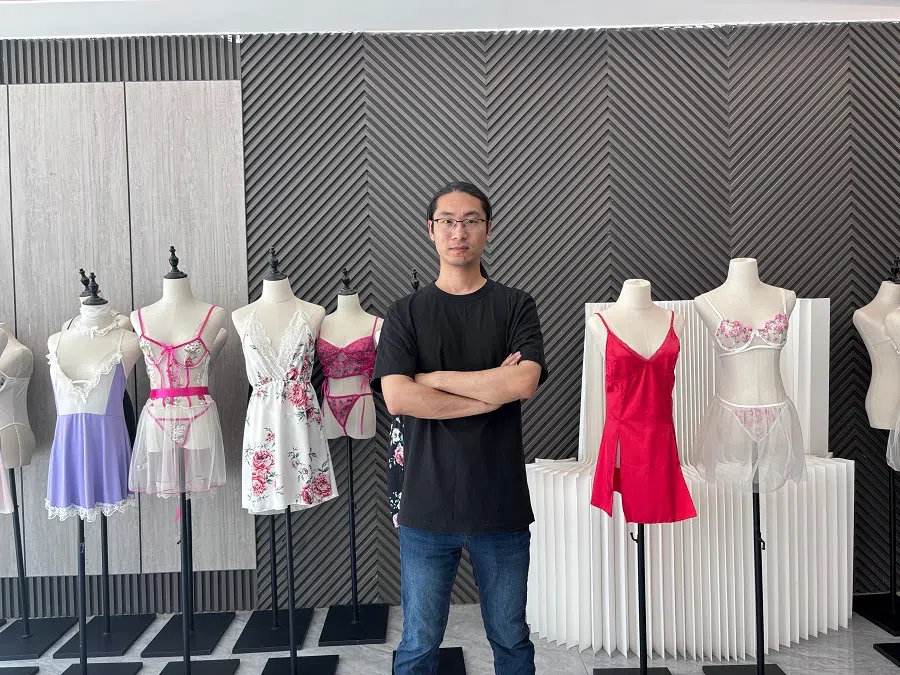
In less than six months, Lei’s small factory grew from seven to 30 employees. Learning that there was a market for lingerie, his relatives and friends joined in as well. Through mutual introductions, an increasing number of Guanyun locals entered the industry. The number of lingerie factories in the county mushroomed to over 100 by 2013.
Presently, there are nearly 2,000 lingerie factories in Guanyun, with thousands of small workshops spread across the villages and towns. Numerous local industry practitioners claimed that Guanyun’s lingerie production accounted for 90% of China’s total output and over half of the world’s production.
Lei attributes Guanyun’s current market scale primarily to its unwavering focus on lingerie production. Notably, during the rapid growth of e-commerce, the county chose not to shift toward the faster-growing women’s clothing sector, allowing it to establish an early advantage as a leading production hub.
Second, market demand for lingerie is growing. Lei said that when he first started making lingerie, China’s total online sales was less than 100,000 pieces annually. Now, daily demand exceeds tens of thousands.
A report by market research firm Mordor Intelligence reveals that the global erotic lingerie market size is estimated at US$21.94 billion in 2024 and is expected to reach US$30.39 billion by 2029. Notably, the Asia-Pacific region is projected to experience the fastest growth.
Cross-border e-commerce opened up overseas markets
Guanyun’s explosive growth in 2013 coincided with China’s “9.9 RMB postage included” offer for lingerie. As the industry went into a price war, some Guanyun manufacturers shifted focus to overseas markets for higher profit margins, despite the higher threshold.
Lei recalled that in 2014, domestic clients often asked if his prices could be lowered, while cross-border clients asked, “Do you need to charge more? Are you even making any money?”
While Guanyun-made lingerie has a significant price advantage, improving quality is crucial to opening the door to mature markets.
But while Guanyun-made lingerie is sold globally, the city still lacks a brand that can rival American lingerie retailer Victoria’s Secret.
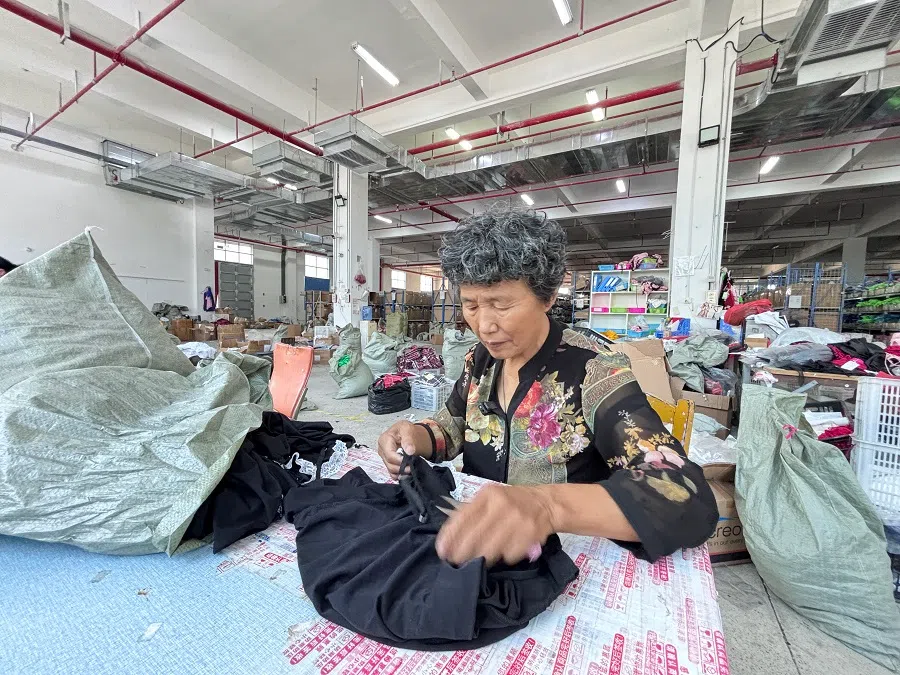
So, Lei started focusing on product development, learning pattern-making, researching market preferences and various body types, and upgrading his equipment. He created an entire overseas series, selling to Europe, North America, Southeast Asia, Central Asia, and even the Middle East and Africa.
He also adjusted his collaboration model, entrusting product design to brands and distributors familiar with local markets, while Guanyun served as the manufacturing base. Currently, Lei’s factory, Midnight Charm Garments (午夜魅力制衣), primarily supplies cross-border e-commerce platforms Shein and Temu, with most lingerie exported overseas.
Guanyun’s local government also periodically organises cross-border e-commerce procurement activities, which also helps local small and medium-sized enterprises access overseas markets. Qian Minggang, 41, owner of Qianxiangge clothing factory (浅香阁服装厂) told Lianhe Zaobao that 20% of his factory’s products are now exported through this channel.
Lack of a well-known local brand
But while Guanyun-made lingerie is sold globally, the city still lacks a brand that can rival American lingerie retailer Victoria’s Secret.
During my visit, I found that many new-generation factory owners who entered the industry in recent years have ambitions to build their own brands.
Du Weikang, 33, owner of Medusa Garments factory, studied fashion design in university and made women’s clothing in Guangzhou for seven years before returning to Guanyun in 2020 to start his factory.
He believes that there is a lot of room for improvement in terms of lingerie materials and design, even in engaging the senses beyond visual appeal. He explained, “For example, adding the scent of violets, so when women open the gift box, they feel like they’re in a secret garden.”
Tao Xiaoxiao is also developing a new brand. She said, “This model uses materials that are not used anywhere else in Guanyun.” She spent three months just on researching the materials.
Lei Congrui invested in branding years ago, but stopped due to sustainability issues. However, he emphasised, “Building brands is something that will continue for sure.”
He noted that over the past two years, the unit price of lingerie consumption has decreased, but total sales remain unchanged.
“Consumption patterns are becoming more rational; we need to reevaluate data to determine suitable brand positioning and pricing,” Lei added.
“Foreigners use these garments more. The locals don’t really have much use for them.” — a local Guanyun resident
Acceptance amid caution
When lingerie first came to Guanyun 20 years ago, most locals did not know what it was or how it could be worn. In that time when sex was a taboo topic, lingerie was equated with obscenity and vulgarity, and producing lingerie was deemed harmful to social morals.
However, after speaking with people on the streets of Guanyun, I found that locals’ attitudes towards lingerie have significantly shifted. Those aware of Guanyun’s lingerie manufacturing generally support the industry’s development.
Uncle Wang, 73, told Lianhe Zaobao that he lives near a few lingerie workshops, and that “these workshops rake in tens of millions every year”.
Another resident, Auntie Song, commented that lingerie has spurred local employment, with many around her working in the industry. However, she added, “Foreigners use these garments more. The locals don’t really have much use for them.”
In lingerie factories and workshops, those that sit in front of sewing machines are no longer just older women who have dropped the farming tools for a new occupation — post-80s mothers and even men have stepped into these roles.
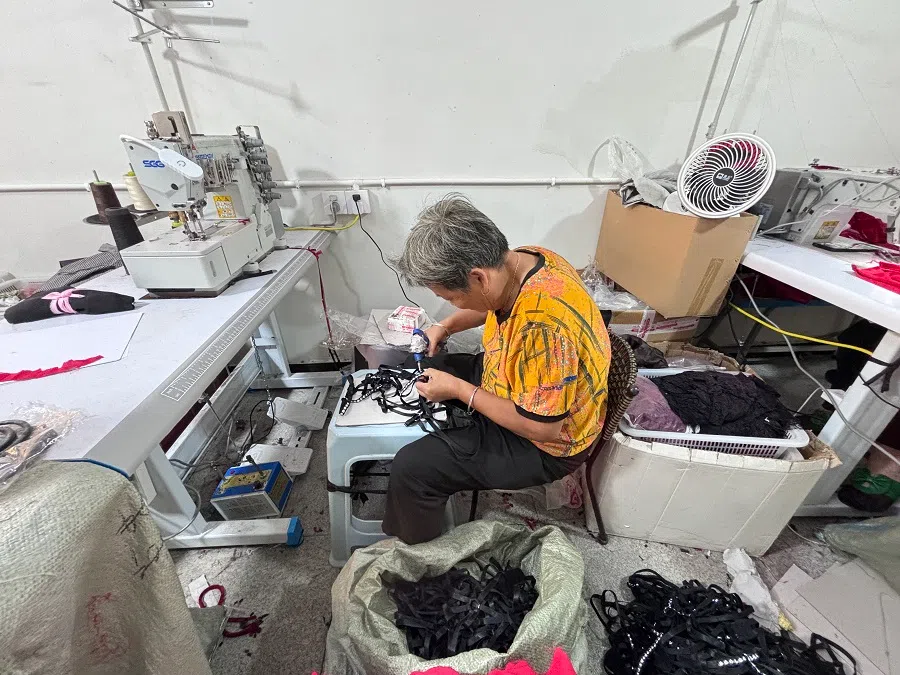
Wu Xiaowen, 38, who runs a lingerie workshop, said that post-80s women with children choose such a job mainly because the flexible working hours do not get in the way of them taking care of their children, nor do they have to go outside of town for work.
These jobs have even enabled some Guanyun women to become the breadwinners for their families. Wang Tingting, 36, who worked at a lingerie workshop for seven years said that women who worked in lingerie factories in Guanyun earn more than men on average, bringing home a few thousand RMB or even more than 10,000 RMB a month.
With the uplifting of women’s economic status, the division of domestic labour within the family has also gradually changed. Wang said, “Every night when I get home, most of the time dinner has already been prepared by my husband, and the floors have been cleaned.” However, she added, “Men still occupy a higher status at home”.
It is only until one walks into the small alleys or turn into an offbeat road can one spot a lingerie factory or workshop.
While the people of Guanyun have embraced the economic benefits brought about by lingerie, people still tend to avoid openly talking about it. The county also avoids displaying any references to lingerie in public areas.
Walking on the streets of Guanyun, one would be hard-pressed to find a lingerie store, or see any pictures, signs or advertisements related to such garments. It is only until one walks into the small alleys or turn into an offbeat road can one spot a lingerie factory or workshop.
Right beside the high-speed railway station, far away from where the people of Guanyun would go about their daily lives, the local government worked with real estate developers and constructed a “Weimi town” — Guanyun’s apparel-themed industrial park — that spans nearly 1,000 acres.
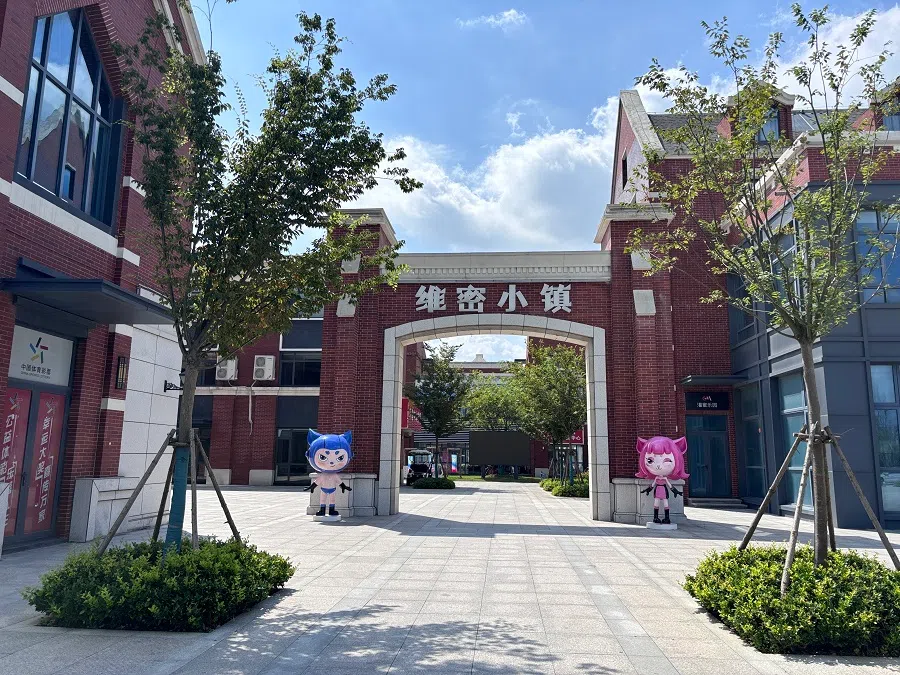
According to plans, this is where major activities related to lingerie are concentrated, from production, logistics, e-commerce to purchasing and tourism. Wholesalers who come down to Guanyun especially to make orders would no longer have to hunt down the traces of lingerie businesses in the nooks and crannies of villages and alleyways, but can instead head directly to the park once they get off the high-speed rail.
Yet on the day of my visit, Weimi town — which had been open for around half a year — seemed quite deserted, and many shops were not open for business. All signs of lingerie disappeared once more as soon as I exited the town towards the high-speed rail station. At the station lobby, a giant advertisement hung on a wall with the words: let the world be filled with love.
This article was first published in Lianhe Zaobao as “贫县蜕变情趣之都撩动全球”.





